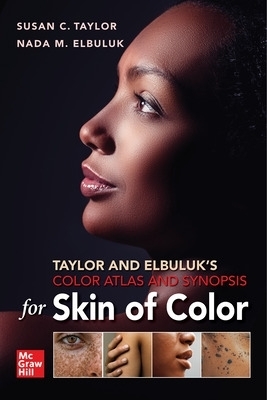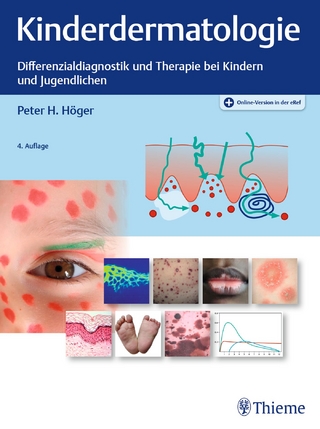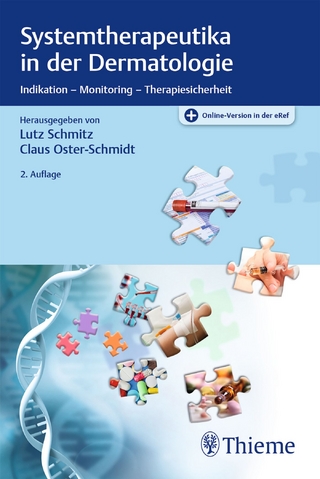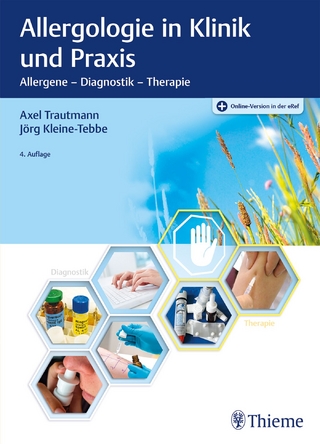
Taylor and Elbuluk's Color Atlas and Synopsis for Skin of Color
McGraw-Hill Education (Verlag)
978-1-264-26890-0 (ISBN)
By 2050, it is expected that over nearly half the U.S. population will have darker skin tones or skin of color, yet physicians are still being trained to diagnose skin conditions based on white skin. Unfortunately, dermatologists, medical students, and other health professionals often inaccurately diagnose skin disease in skin of color patients due to inadequate training.
The perfect resource for comparative study of dermatologic disorders in skin of color, Taylor and Elbuluk's Color Atlas and Synopsis for Skin of Color helps you recognize the differences between skin of color and Caucasian skin and provide optimal diagnosis of patients with all skin tones. Through hundreds of color images, this unique guide illustrates the differences in appearance of common dermatology conditions between Fitzpatrick’s Skin Type I-III light skin tones and Fitzpatrick’s Skin Type IV-VI dark skin tones. Taylor and Elbuluk's provides a comprehensive look at common diseases that fall into the following categories:
Inflammatory/Papulosquamous Disorders
Infections
Infestations/Bites
Drug Reactions
Follicular Disorders
Benign Neoplasms
Malignancies
Alopecias
Pigmentary Disorders
Photosensitivity
Dr. Taylor is Harvard trained and is internationally recognized for her research in skin of color. She is the director of the first-of-its kind Skin of Color Center at St. Luke's-Roosevelt Hospital Center, NYC. She is chair of the Women's Task Force and a member of the Health Care Delivery Committee and the Minority Student Mentors Program for the American Academy of Dermatology. In May of this year, Amistad Publishing (Harper Collins) published a trade bok entitled BROWN SKIN: DR. SUSAN TAYLOR'S PRESCRIPTION FOR FLAWLESS KING HAIR AND NAILS.
Inflammatory and Papulosquamous Disorders
Atopic Dermatitis Morphological types
Papular eczema
Follicular accentuation
Dyschromia
Lichenification
Pityriasis alba
Psoriasis
Morphology and color (violaceous and hyperpigmented with lichenification vs erythematous and devoid of silvery white scale)
Contact Dermatitis
Morpholology and color (hyperpigmentation vs erythema vs LPP-like in South Asian population)
Pityriasis Lichenoides Chronica
Morphology and color (hypopigmented patches or vitilgo like in darker skin vs erythematous guttate papular appearance in light skin)
Pityriasis Rosea
Morphology and color (similar distribution hyperpigmented to violeceous vs. erythematous; papular variant)
Seborrheic Dermatitis
a Facial Morphology and color (petaloid seborrheic dermatitis and hypopigmentation vs erythema)
b. Scalp - Morphology and color (more scale vs sebopsoriasis like in lighter skin)
Lichen Planus
Morphology and color (similar morphology except hypertrophic LP darker violet or brown to black vs bright violet in lighter skin)
Lichen nitidus (B)
Color (Highlight differences in flesh color)
Infections
Tinea Versicolor
Morphology and color (less pink or red or hypopigmented or hyperpigmented; sequelae of pigmentation remains)
Tinea Capitis
Morphology (kerion)
Tinea Corporis
Color (erythema vs Hyper- or hypopigmentation)
Impetigo
Morphology and color (erythema vs hyperpigmentation; both have honey colored crust)
Cellulitis
Color (lack of erythema)
Syphilis
Morphology (secondary syphilis with moth eaten alopecia; palmar lesions, facial rash)
Verruca plana
Color (skin colored papules that can be missed)
Molluscum
Color (skin colored papules that can be missed)
9a. COVID-19
Infestations/Bites
Scabies
Morphology and color (differences in location such as inter-digital; more erythematous)
Pediculosis
Erythema Migrans
Color (lack of erythema vs hyperpigmentation and the intensity of violet hues)
Drug Reactions
DRESS
Color (pigmentary differences)
Morbilliform Drug
Color (pigmentatio
n difference both popular)
Fixed Drug
Color (lack of erythema vs hyperpigmented to black hue)
Steven’s Johnson Syndrome/Toxic Epidermal Necrolysis
Morphology and color
Follicular Disorders
Acne
Morphology and color (post-inflammatory hyperpigmentation and sequalae; definition of scarring)
Rosacea
Morphology and color (under-diagnosed in darker skin)
Perioral dermatitis
Morphology and color (pigmentation difference vs erythema
Folliculitis
Morphology and color (similar to acne)
Hidradenitis Suppurativa
Morphology and color (pigmentation difference vs erythema (keloidal scarring)
Pseudofolliculitis Barbae
Morphology and color (pigmentation difference vs erythema)
Benign Neoplasms
Seborrheic Keratosis and Dermatosis Papulosis Nigra
Morphology and color (pink vs brown; size and distribution)
Dermatofibroma
Color (pink vs brown)
Scars
Morphology (hypertrophic scar vs keloid
Malignancies
Basal Cell
Color (pigmented vs classical pink)
Squamous Cell
Color (pigmented vs classical pink)
Melanoma
Morphology and color (location acral and melanonychia)
CTCL
Morphology and color (hypopigmented Mycosis fungoides; follicular or sryingotrophic which may look like keratosis pilaris)
Alopecias
Lichen Plano Pilaris and Frontal Fibrosing Alopecia
Morphology (triad of follicular papules, LPP and FFA in darker women)
Traction Alopecia
vs FFA
Discoid Lupus Erythematosis
Morphology and color (degree of hypopigmentation; follicular plugging)
Folliculitis Decalvans
Morphology and color (differences and keloid scarring
Dissecting Cellulitis (B)
Color differences
Pigmentary Disorders
Melasma
Color (degree of pigmentation; telangectasias; confluence of pigmentation; extra-facial melasma)
Postinflammatory Pigmentation
vs PIE
Photosensitivity
PMLE(B)
Chronicactinic dermatitis
Morphology and color (more erythematous in white skin and darker and more lichenified in darker skin
Vascular Disorders
Purpura and vasculitis
Morphology and color (violeceous)
Miscellaneous
Extrinsic Aging
Morphology and color (rhytids and lentigines vs no lentigines and fine rhytids)
Sarcoidosis
Diabetes Mellitus
Acanthosis Nigricans (color difference)
Diabetic Dermopathy (color difference)
Idiopathic Guttate Hypomelanosis
Morphology and color (quantity and size in darker skin hues)
Urticarial Bullous Pemphigoid
Morphology and color
| Erscheinungsdatum | 21.07.2023 |
|---|---|
| Verlagsort | OH |
| Sprache | englisch |
| Gewicht | 547 g |
| Themenwelt | Medizin / Pharmazie ► Allgemeines / Lexika |
| Medizin / Pharmazie ► Medizinische Fachgebiete ► Dermatologie | |
| ISBN-10 | 1-264-26890-4 / 1264268904 |
| ISBN-13 | 978-1-264-26890-0 / 9781264268900 |
| Zustand | Neuware |
| Informationen gemäß Produktsicherheitsverordnung (GPSR) | |
| Haben Sie eine Frage zum Produkt? |
aus dem Bereich


